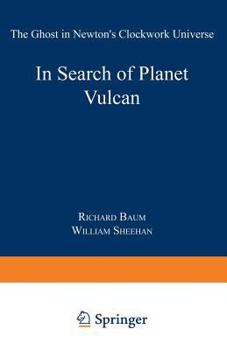In Search of Planet Vulcan: The Ghost in Newton's Clockwork Universe
Select Format
Select Condition 
Book Overview
Presented for the first time in popular form is the fascinating true story of the search for the phantom planet Vulcan. As with legends of "the lost continent of Atlantis," scientists and dreamers... This description may be from another edition of this product.
Format:Paperback
Language:English
ISBN:0306455676
ISBN13:9780306455674
Release Date:January 1997
Publisher:Springer
Length:310 Pages
Weight:1.20 lbs.
Dimensions:1.2" x 5.8" x 8.5"
Customer Reviews
4 ratings
A great read
Published by Thriftbooks.com User , 20 years ago
This was a fascinating story, the search for a planet whose orbit was inside Mercury's. So sure were astronomers of the time that it existed they gave it a name, Vulcan. An amateur, Lescarbault, claimed to have seen it pass in front of the Sun, but in the proceeding years, no one else could catch a glimpse of it. So, did it really exist, and if not, how to explain the perturbation in Mercury's orbit? I thought this book was very well written in its depictions of real people and the encounters they had with each other as they raced to become the first to prove the existence of Vulcan. The hard science is written in a way to be understandable even to people like me without a mind for it.
Another home run by Sheehan...
Published by Thriftbooks.com User , 25 years ago
Another gem of a book by William Sheehan, joined in this venture by astronomer Richard Baum. In the 18th and 19th centuries, Newton's theory of universal gravitation had enjoyed some incredible triumphs, and stood as a monument to the mathematization of science. Three thorny problems remained however, to disrupt the harmony of Newton's universe: the motion of the moon, Mercury, and Uranus. Sheehan and Baum tell the amazing tale of mathematics and astronomy in their pursuit of the answers to these puzzles. This book is a must-read for any buff of astronomy history - Newton, Horrocks, Clairaut, Laplace, Lagrange, and so on. Considerable time is given to the discovery of Neptune, first on paper by Adams and Le Verrier, and by Galle at the telescope. Sheehan and Baum's retelling of his historic tale is even better documented than Grosser's book on the subject. Finally, the problem of the shift in Mercury's orbit. The pressure to find a Newtonian solution was immense, given the previous victories obtained using Newtonian mechanics. Le Verrier was susceptible to this pressure, owing at least in part to his previous success with Neptune. However, this problem resisted even Newton, and was not finally solved until Einstein's theory of gravity supplanted Newton's early in the 20th century. The interwoven stories of astronomers and their diligent search for the elusive planet Vulcan are entertaining and provide a unique perspective on 19th century astronomy.
The concepts behind the discovery of the solar system
Published by Thriftbooks.com User , 26 years ago
As an occasional naked eye astronomer I was able to follow Sheehan and Baum's work without difficulty. They provide an accessible history of the development of the concepts that lie behind the discovery of the solar system from Ptolemy to Einstein. They describe observations by astronomers but also pay attention to contributions from mathematicians without presenting the readers with a single equation. There are brief biographical asides on some of the main players (Sheehan's day job is as a psychiatrist) but the main thrust of the book is scientific.Particular interest is shown in the (serendipitous) discovery of Uranus followed by the (predicted) discovery of Neptune. The discovery of Neptune based on the known perturbations of the orbit of Uranus. This success focussed attention on the erratic orbit of Mercury, which advances seemingly inexplicably. We now know that this apparent motion is caused by the bending of space/time by the Sun's gravity, but the authors leave this for last. At the top of the conceptual staircase we learn that when Einstein explained the advance in Mercury's orbit using Relativity he couldn't sleep for 3 days with the excitement.
A compelling search for a nonexistent planet
Published by Thriftbooks.com User , 26 years ago
I know what you're thinking--an entire book about a planet that doesn't even exist? Although Vulcan doesn't exist, fortunately this book does, because it's very good. The early pages tell us a little more than we need to know about Kepler and Newton, who are hardly central to the story, but then it moves to the discovery of new planets--Uranus, Neptune, and then to the heart of the matter: the irregularities in Mercury's motion that seemed to signal the existence of Vulcan, a planet inside Mercury's orbit. The book has plenty of notes and references, but it's also a lively and compelling read. It fits in well with other recent planet books, such as David Grinspoon's VENUS REVEALED, Alan Stern and Jacqueline Mitton's PLUTO AND CHARON, and Ken Croswell's PLANET QUEST. Plus, it's got a cool cover!






